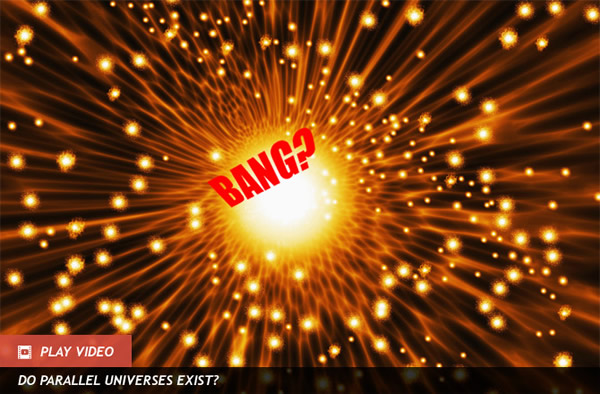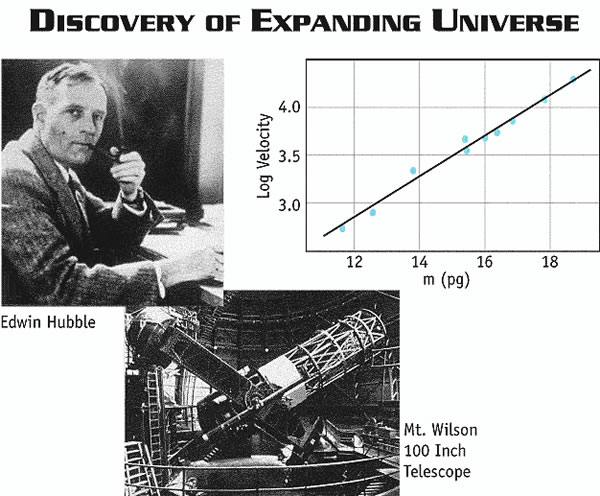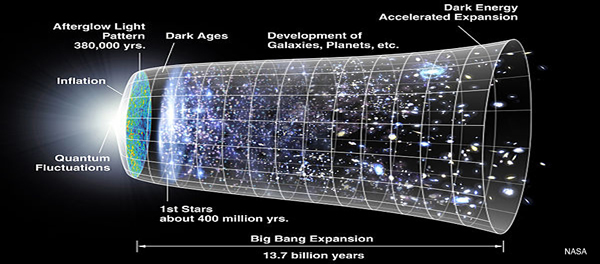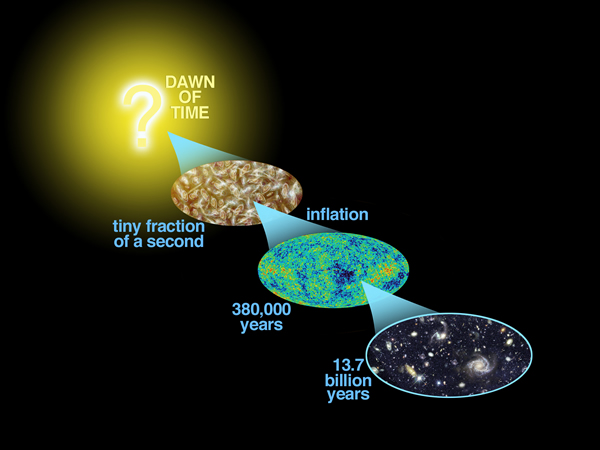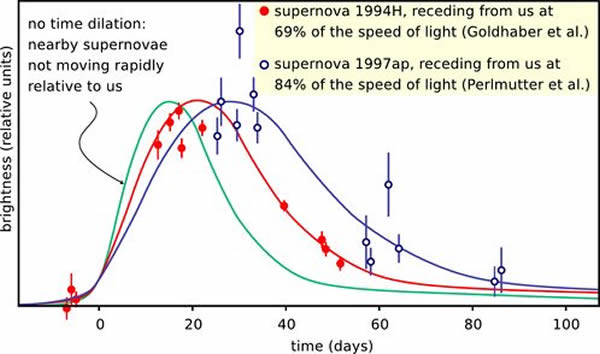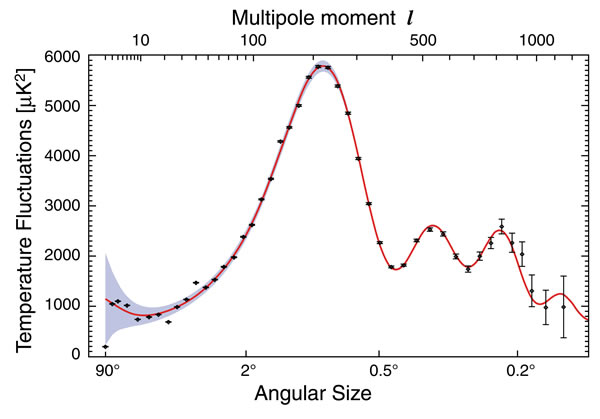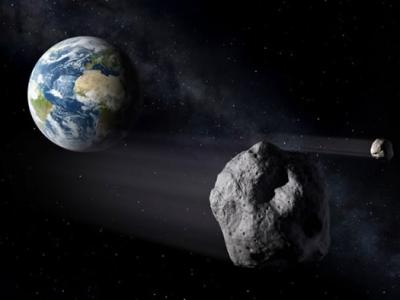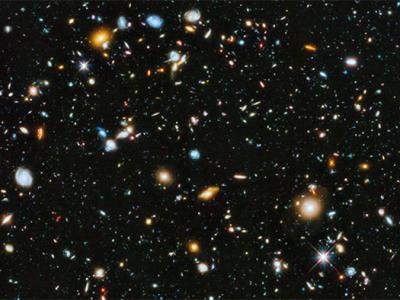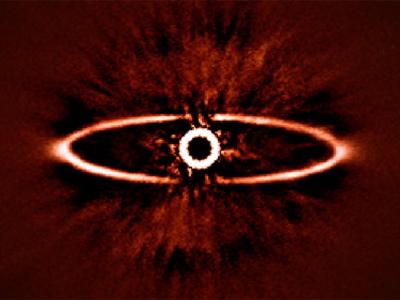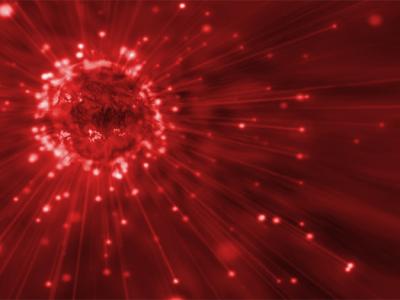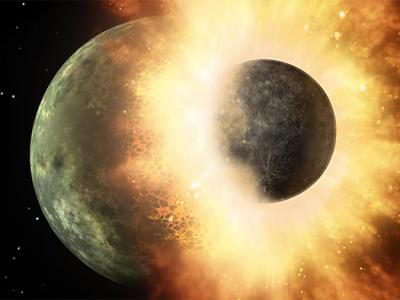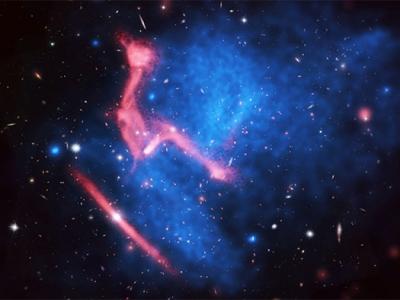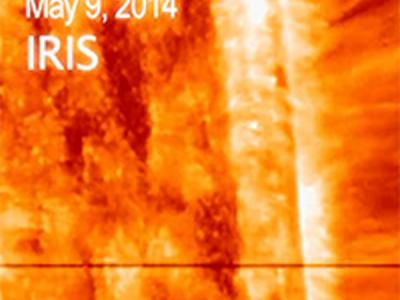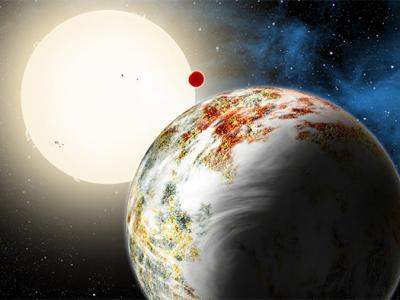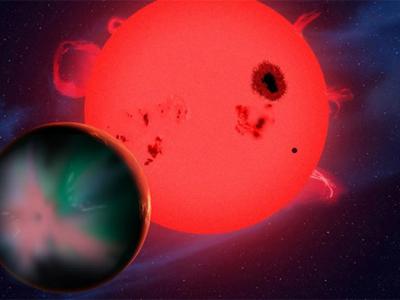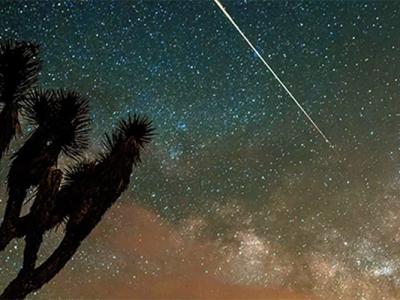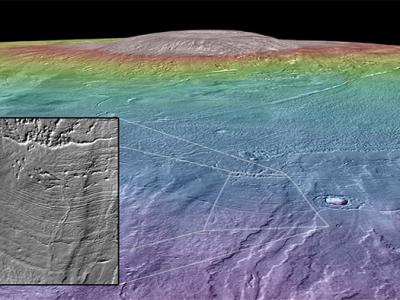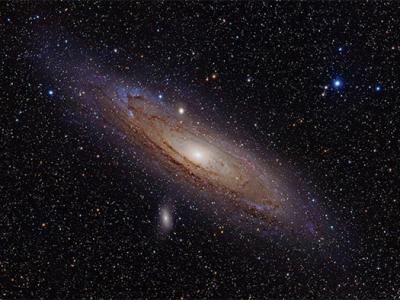Is The Universe Expanding Or Just Getting Heavier?
Is The Universe Expanding Or Just Getting Heavier?
Big Bang.
If the term weren’t so legendary — and notorious to some — you’d think it was the name of a monster truck rally, a fireworks store, or sugar-drenched breakfast cereal.
In reality, “Big Bang” describes what is commonly understood to be the instantaneous birth of the universe 13.7 billion years ago as an ultra-compact, yet rapidly expanding, fireball.
The earliest cornerstone for the Big Bang theory is spectral data that showed the light from distant galaxies is proportionally redder (redshifted) than from local galaxies. This is interpreted as being caused by the uniform expansion of space that attenuates light, as predicted by Einstein’s Special Relativity. The rate of expansion gives an age for the universe and inevitably leads to the conclusion the universe was once smaller, denser, and much, much hotter.
Georges Lemaître and Edwin Hubble independently discovered this distance-redshift relationship nearly a century ago. A Catholic Jesuit priest, Lemaître went on to hypothesize a primordial “egg” from which everything began.
I could fill a computer hard drive with e-mails I’ve received over the years from what I’d collectively call the “Big Bang haters” — most are from amateur theoreticians who say they’ve figured out a way to get rid of the Big Bang.
Some examples:
“Thus the black hole and Big Bang cosmology contradict one another.”
“The thing about the Big Bang is that it wasn’t a ‘bang’ at all. Expansion implies outward motion, which is not correct.”
“… It is possible to draw a conclusion that singularity and the Big Bang wasn’t. Our Universe arose another way.”
Science writer Eric Lerner made a brief splash in 1991 with his book, “The Big Bang Never Happened.” It describes a universe dominated by plasma physics as first proposed by Nobel Laureate Hannes Alfvén in the 1960s. Astronomical observations in the 1990s and later contradicted many of Lerner’s predictions that he thought would disprove the Big Bang.
The Big Bang is frequently ridiculed in creationist articles alongside Darwinian evolution. “It [the Big Bang] fits evolution so well, and thereby pushes God so far out in space and so far back in time that He is essentially eliminated altogether,” complained one so-called creation scientist.
The Big Bang Haters Club alleges that there is an elitist cadre of astronomers who will belittle and suppress any theories that are contrary to Big Bang cosmology.
Now Christof Wetterich, a theoretical physicist at the University of Heidelberg in Germany, has floated a radical new theory. He theorizes that the expansion of space is an illusion; the universe isn’t going anywhere and, in fact, may be contracting. The spectral redshift is not due to the expansion of space like stretching a rubber sheet, but a slow and steady increase in the mass of the universe. The stunning consequences would be that the cosmic yardsticks used for measuring the universe are shrinking over time.
Some astrophysicists have described the as yet unrefereed paper as a novel “fascinating alternative” to cosmology that is worth pondering. Some regard it at as an alternative perspective on current cosmology rather than a competing model.
Other experts have been more dismissive, saying essentially, “you’ve got to be kidding me.” But the astronomical community isn’t collectively ganging up on Wetterich to deflate his idea or dismiss him, as conspiracy theorists would predict.
If his theory was true it would mean that there’s been a gross misinterpretation of all our spectral data on extragalactic objects. He hypothesizes that galaxies look redder at increasingly farther distances, not due to the expansion of space, but because atoms gain mass over time. The more massive an atom, the more energetic the photons are that it emits. And they would proportionally move toward the bluer end of the electromagnetic spectrum. Emission from the same lower mass atoms would be redder.
This steady increase of mass over time would be proportional to the galaxies’ distances and therefore “look back time” — as regulated by the limits imposed by the speed of light. If astronomers assume that mass remains constant, then the only explanation is that expanding space is stretching the wavelengths of light.
The elegance of this theory, says Wetterich, is that it gets rid of the notion of the universe spontaneously arising from a singularity, an infinitely dense quantum seed that preceded the appearance of time and space. What we call the Big Bang would stretch infinitely into the past according to his theory.
This means the cosmos could be stationary and somewhat more akin to the steady state universe promoted by British cosmologist Fred Hoyle over a half century ago. Ironically, Hoyle came up with the phrase “Big Bang” in a British radio call-in show in the late 1940’s. The name stuck, despite such alternative names offered like Bertha D. Universe, in a Big Bang renaming contest.
A successful scientific theory is Copernican, has symmetry, and simplicity. Is the variable mass universe a better theory by dumping the idea of a Big Bang singularity? As astrophysicist Larry Krauss describes classic Big Bang cosmology in a recent book titled: Something from Nothing.
“A simple model leads to a cosmology with a sequence of inflation, radiation domination, matter domination, dark energy domination which is consistent with present observations,” writes Wetterich.
But the fundamental problem is that theories come and go but observations last forever. And the weight-gaining universe runs head-on into some observational reality.
To put it more succinctly, I’ll borrow from a popular phrase from the 1950s “I Love Lucy” TV show where an angry Ricky Ricardo often said to his wife Lucille Ball: “You’ve got a lot of ‘splaining to do!”
First is the evidence for time dilation. Special relativity predicts that time will appear to slow down relative to distance in an expanding universe. This is beautifully seen in Type 1a supernova explosions. Like running a movie in slow motion, the explosions successively takes longer to happen the farther the supernova is from Earth. This is exactly what has been recorded in numerous observations.
Second, the Big Bang theory has mostly hydrogen and helium nuclei cooked up in the first three minutes of creation. The rest of the elements had to be assembled over time though nucleosynthesis in evolving stars. The universe quickly got polluted with heavier elements in its early formative years when it underwent firestorms of starbirth in newborn galaxies. This becomes problematic in a static universe.
Third, the 800-pound gorilla in the room is cosmic microwave background (CMB), our earliest all-sky image of the universe before stars and galaxies ever existed. Over the past decade a so-called power spectrum has been measured from the mottled pattern of the CMB’s acoustic vibrations.
The pattern exists because perturbations in the Big Bang plasma started to grow in density as gravity compressed photons until they had enough radiative pressure to push back. The oscillations continue to be observable because they were transparent to light 360,000 years after the big bang. The CMB is a snapshot of that game-changer in the universe’s evolution. This spectrum establishes the exact mixture of material in the universe as well as the cosmological parameters measured today.
Nevertheless, will the mass-variable universe gain traction among some theorists? A big problem is that the hypothesis is not testable in the laboratory. We simply can’t measure if atoms are getting heavier.
A practical problem is that we need a name for an alternative universe that sounds cooler than Big Bang.
Image Credit: NASA(Aug 22, 2013 02:09 PM ET // by Ray Villard )
